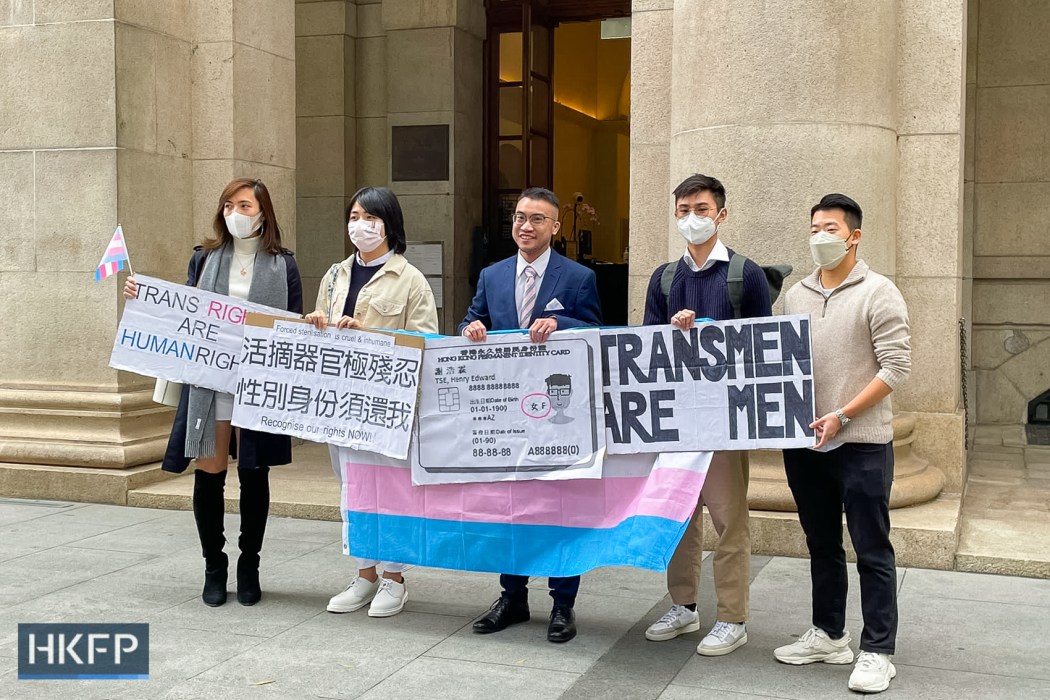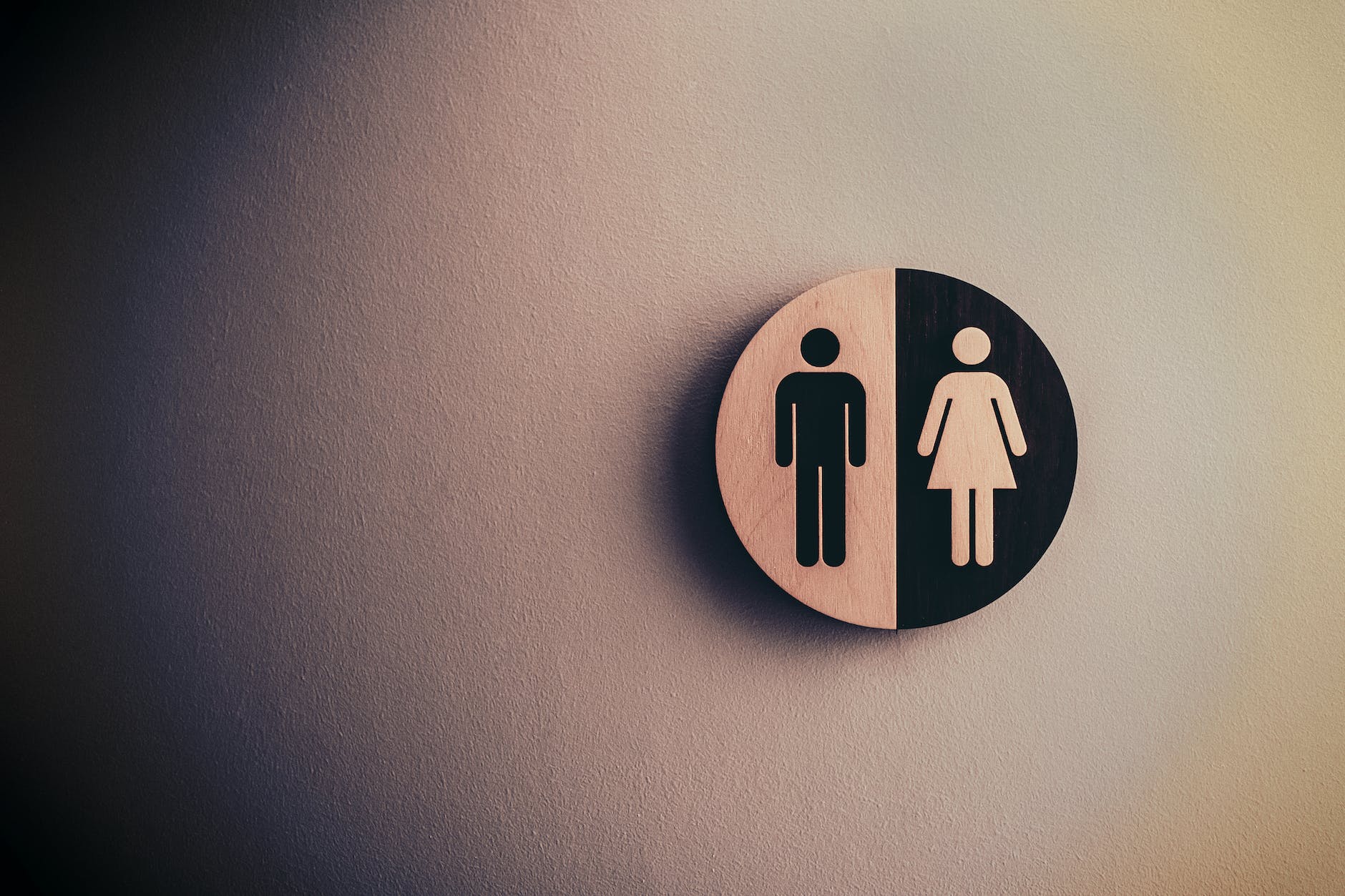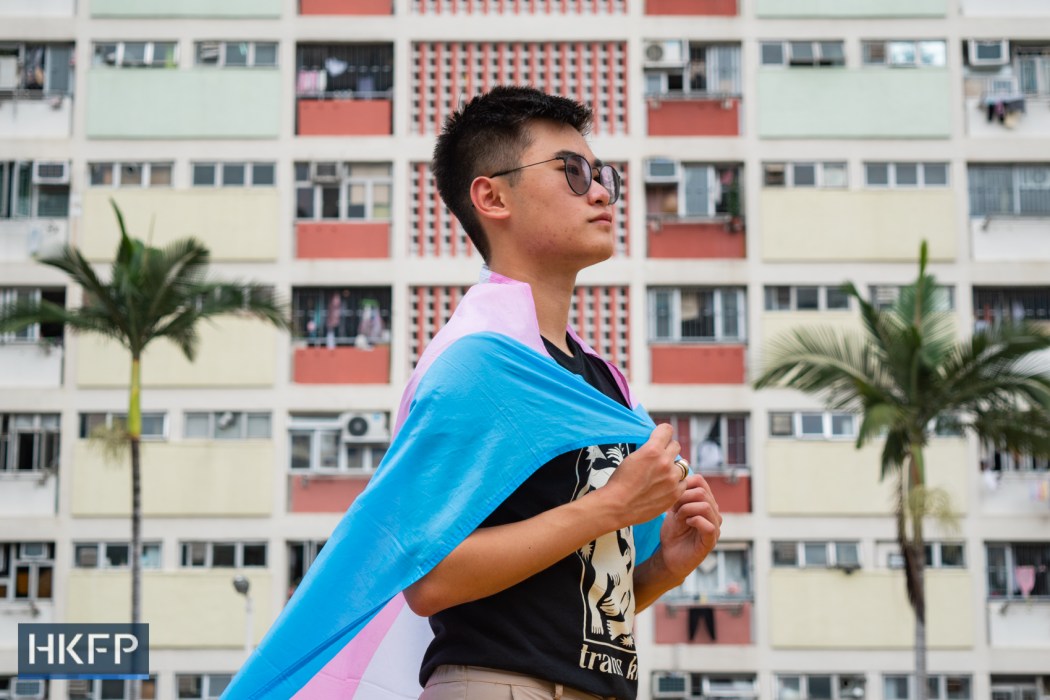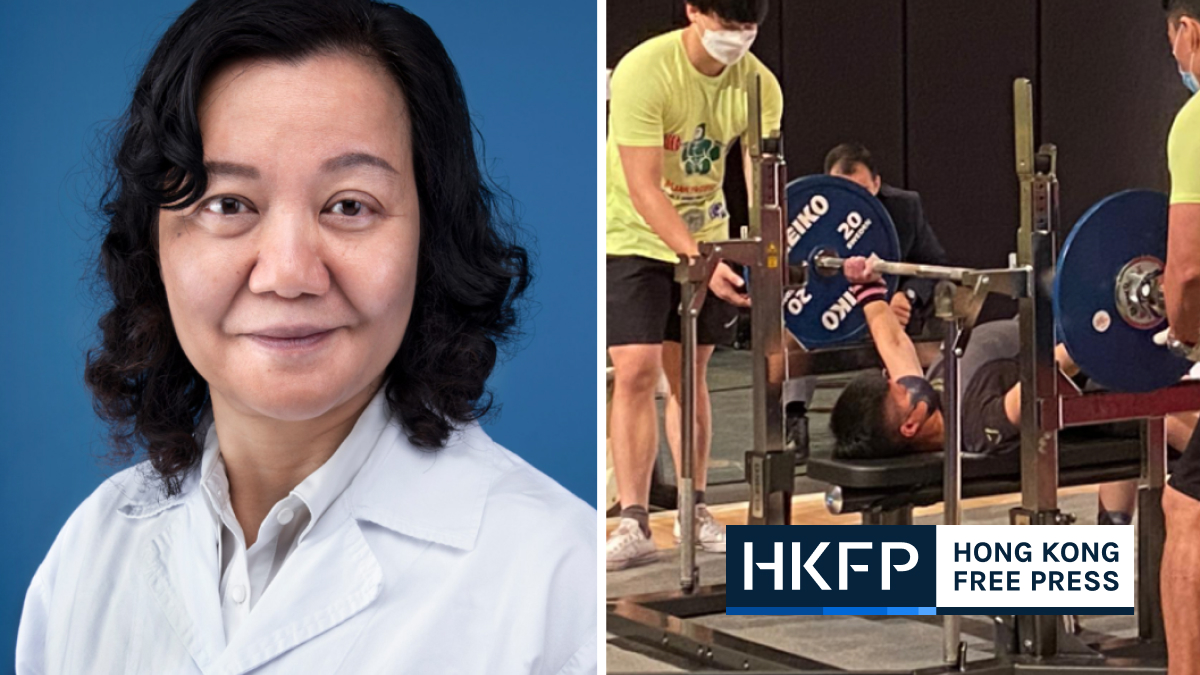It has been more than four years since Hong Kong trans activist Henry Edward Tse began an uphill legal battle to get the government to recognise him as a man.
In early January this year, he donned a smart navy blue suit, paired with a carefully-chosen blue-and-pink tie, for his appearance at the Court of Final Appeal.

Standing outside court for a photo call, Tse’s necktie matched the white, blue and pink striped flag – one that represents the transgender community – he carried. He also displayed a printed prop of a Hong Kong identity card bearing his Chinese and English name, with the gender marker “F,” for female, circled in red like a homework mistake.
Tse, a transgender man, has long been fighting to change the gender marker on his ID card from female, his assigned sex at birth, to male, his acquired gender. In 2017, his initial application to do so was rejected, with the Commissioner of Registration citing failure to undergo full sex reassignment surgery as required by the city’s legislation.
Tse, along with two other transgender men who faced the same issue, lodged a judicial review arguing that the surgical requirement was unconstitutional and violated their right to privacy. It was heard in 2018, but dismissed a year later.

Despite having subsequent bids quashed by lower courts, the activists fought all the way to the top of the judicial ladder, hoping the final review hearing on January 4 would grant them the right to fully, finally be themselves.
On Monday, that right was granted, when a five-judge panel ruled that the government policy infringed on their constitutional right to privacy.
Gender dysphoria
Tse, who is now 31, first experienced gender dysphoria as a young child. The condition, sometimes called gender incongruence, occurs when the gender identity of a person does not align with the gender they were assigned at birth. Tse’s situation worsened when puberty hit, especially in what he described as a “homophobic environment” at the religious all-girls secondary school he attended.
“From the very first day, we were told that we need to ‘be a lady’ and be elegant,” Tse told HKFP. Having always sported short hair, he said he was picked on by some teachers who assumed he was a tomboy and thus a bad student.

Tse said he encountered homophobia while playing on the school’s basketball team, adding that it was experiences such as this that sparked in him the desire to effect change.
After completing the public exam in Form Five, Tse left for the UK. Later, as he was preparing to enter university, he realised he didn’t want to be seen as a woman anymore.
“No matter what I did – binding [my chest] or adjusting my mannerisms – [it] all felt inadequate,” he said. He started hormone treatment in 2012 and underwent top surgery to remove his breasts the following year.
Tse said his gender dysphoria largely stemmed from his physicality, so after the mastectomy he did not feel the need for a more invasive procedure to remove his uterus and ovaries. He also successfully changed the gender marker on his British passport to male and had no problem living and working as a male during his time in the UK.
But the situation was completely different when Tse returned to Hong Kong, where he was still labelled as female on his ID card.

“In Hong Kong, we are required by law to carry our ID card with us every day. The police can request to check your ID anytime. You basically need your ID card for everything. So when it plays such an important role in your daily life, the mismatch [of the gender marker] becomes a huge problem,” he said.
Tse describes a feeling of panic that overwhelms him whenever he has to show his card, because he cannot anticipate the reaction.
“I also feel like my privacy has been intruded on… because it exposed my history of being transgender,” he said. Every time he presents his ID card, he is forced to “come out” again.
The activist also feels embarrassed and humiliated when bank tellers use a female honorific to address him. “When they call out ‘Miss XXX,’ people would then look at you, puzzling why you are a ‘miss’.”
Chosen family
Tse kept his journey through gender dysphoria, mental suffering and the challenges of being recognised in society largely from his family. They were “very conservative” and considered gender non-conforming behaviour in general to be problematic, he said.
“My dad had asked if he needed to bring me to a doctor [when I was younger]. Up to the moment I told him I would be lodging a lawsuit, he still thought it was problematic… He thought the whole thing was bad behaviour,” Tse said.
But Tse was able to find his chosen family – a term commonly used among the LGBTQ+ community to describe ties with others that offer greater acceptance. He connected with other trans men in Hong Kong, and in 2020 founded an NGO called Transgender Equality Hong Kong (TEHK) .

TEHK deputy director Dominic Wong has always supported Tse and helped him with rights advocacy. Wong said he thought of Tse not only as his boss but also as his mentor.
Wong, a 19-year-old transgender man, works mostly remotely for TEHK while pursuing his studies in the US. He sat down with HKFP when he returned to Hong Kong last year and described a trans journey with both similarities and differences to Tse’s.
Wong was born in Hong Kong but spent much of his childhood in the mainland Chinese city of Guangzhou. He later spent one year studying at a Hong Kong secondary school before travelling to the US to continue his education.
The teen said he experienced early symptoms of gender dysphoria as young as two or three years old, such as feeling that he should be urinating standing up, but did not have the words to articulate his discomfort at the time.
Wong also went to an all-girls high school, but in the US. His learning environment was a stark contrast to Tse’s.
‘Progressive, accepting space‘
After he transitioned, he was accepted at school and succeeded in getting the school to redraft its handbook to be more gender-inclusive. He and his schoolmates also fought for more gender-neutral bathrooms on campus.
Wong’s parents were also more accepting, although his “very typical Chinese father” was not like “US liberal parents hugging kids and crying ‘I accept you’,” he said. However, Wong describes being touched by his father’s small actions.

The day after he came out to his father, he had to fly back to the US so his father ordered him a taxi to the airport.
“The taxi driver was asking who is this cab for, and then he just said ‘my son’.”
“And that’s the moment when I realised that he fully accepted me. It’s so under the water, nothing emotional, but it just flows like that.”
Wong stressed he was “incredibly privileged in many ways,” including having the resources for his medical needs and the opportunity to fulfil them abroad, as well as having understanding and accepting parents.
Despite not being based in Hong Kong, Wong hopes to help those less privileged in the city.
From invisible to visible
For Tse, challenging government policy in court was more than about fighting for justice and rights. It was also about making transgender people more visible in Hong Kong.
The activist devoted months to a multimedia advocacy project called Transmen in Hong Kong: Visibility vs Invisibility, hoping to shine a light on the underrepresented community.
The landmark judgement delivered on Monday should help matters. Addressing reporters outside the Court of Final Appeal all those years after launching the first legal challenge, Tse called the judges’ decision “delayed justice.”
He thanked his lawyers and all those who have supported him along his journey, “especially the lads and the volunteers who have helped in the Transmen in Hong Kong project. Without them, [this] historic moment… would not have happened.”
But, Tse’s work is not done yet. He vowed to keep pushing for trans equality.
“I believe that one day, we shall succeed and welcome the rainbow with open arms.”
Correction 13/2/2023: An earlier version of this article misstated that Dominic Wong was born in Guangzhou, in mainland China, when he was actually born in Hong Kong. We regret the error.
Support HKFP | Policies & Ethics | Error/typo? | Contact Us | Newsletter | Transparency & Annual Report | Apps
Help safeguard press freedom & keep HKFP free for all readers by supporting our team

LATEST FROM HKFP
HKFP has an impartial stance, transparent funding, and balanced coverage guided by an Ethics Code and Corrections Policy.
Support press freedom & help us surpass 1,000 monthly Patrons: 100% independent, governed by an ethics code & not-for-profit.











